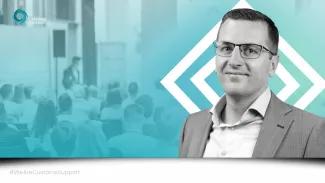Who are you?
I’m Andy Leenders, and I have been with Customs Support since January last year.
I started in the logistics industry in 2008, working my way up from making the tea and processing documents to more senior roles. As I made my way up the chain, I worked on learning as much as I can and educating myself about everything around the sector.
My roles have taken me across Europe and Asia. From meetings around a small table in Japan to negotiating in the middle of a Saudi Arabian desert, I have worked on projects with people who have a variety of different cultures and backgrounds.
As time went on, I discovered that I was more fit for a commercial role and have evolved in that direction using the operation skills that I have. I have an eagerness to know how and why things are functioning for customers, and then work to provide the best solution that we can.
You’re the business development director for Customs Support Belgium, tell us about your role
Customs Support Belgium is up and coming, ready to be taken to that next level as the existing team has grown following an acquisition last year. We already have a great foundation of trust and expertise, both within the team and with our customers, so it’s time for us to build.
What we want to do is take that legacy and be a bit more proactive and push forwards, whilst keeping the quality that our existing customer base have come to rely on.
It’s my job to lead the team in being more outgoing in that sense, but also to lead our customers into the digital age of customs as we tackle supply chain challenges and keep trade moving. I open that door for clients, assess what we can do, introduce the required experts, and deliver the right solution.
What does your typical working day look like?
I meet with a lot of people and customers in Belgium, and I like to split that time between virtual and in-person meetings. Although I prefer face-to-face meetings and feel it is important to shake someone’s hand before sitting down for a good discussion, the area we are in is notorious for bottleneck traffic.
In my appointments, I can be collaborating with colleagues across the group or visiting clients and potential customers. These are all busy people, so having an optimised agenda is key. Thankfully, digital meetings have become the norm for many, which allows me to protect my schedule by reducing the risk of traffic jams.
Other than that, it’s staying on top of my emails and admin, looking into the right solutions for customers, and fulfilling the requests that come in from my colleagues and higher management.
What do you like most about your role?
I like that feeling when I step out of a meeting at the end of an implementation process, where we’ve succeeded in delivering what we suggested and seen that it has added real value to the customer’s business. It’s such a win/win for everyone involved and I thrive on that. It’s great to hear a customer tell me they wish they’d done it sooner, and to know what we do has impact.
When I said before that we have a lot of trust in the Belgium offices, it wasn’t just a hollow phrase. The people that I work with consistently deliver on what we agree to do commercially, and I cannot understate it enough that it is essential for us to have that.
Knowing the team can back me up means that I can perform well in my function and that I am not over-promising. Instead, I am able to have those open conversations about which direction we should take and not worry about whether we will be able to make it happen or not.
This is what gives me the most energy and job-satisfaction, being able to deliver on promises and create win/wins as a team.
What excites you about being part of a Europe-wide network?
It is soothing to know that we don’t only have a great team in Belgium, but a whole range of experts throughout Europe. If we need help on a particular process or country, then that support is only a phone call away.
I started at Customs Support around the same time as Emmett Young in the UK, and Stephan Hoffert in France. With all three of us going through the onboarding at the same time, operating in neighbouring countries, and getting to know each other’s challenges, we’ve been able to create that extra bond that is important when we need to collaborate.
Of course, Customs Support has more than the three of us, and the teamwork I see is across the whole group is fantastic. It gives me real confidence when looking at solutions for customers.
What’s the next stage of development for Belgium?
As part of the merger, we are combining the people from both of our offices and relocating to Antwerp. Although we work well remote from one-another, that synergy and cooperation will improve when we are sat together in the same office.
We are also creating a more dynamic sales team, maturing what we had under previous owners and bringing in more structure so that we can operate more efficiently. It is our aim to expand our portfolio in Belgium and provide a wider range of solutions to clients.
Why is an office in Antwerp important?
Antwerp is an important place of trade, and has been for over 500 years. In a port city like that, there are a lot of opportunities for businesses in our sector. It makes sense for Customs Support to have a presence when the city attracts a lot of professionals from the industry.
The reason to move is twofold, though. The original Customs Support Belgium has a small office in a typical suburban kind of setting, and we are quickly outgrowing it. Our colleagues in the new acquisition are also outgrowing their office and need to move. With both offices needing to merge and relocate, now is the time for us to select a more prominent location for our people to work.
What do you do to keep yourself active and relieve stress away from your role?
I am a reader, with non-fiction and history books being my favourite. That’s another reason why I love Antwerp: if you look back at the “Golden Age” of Antwerp, around the 16th century, you can see the significance of the port on trade in Europe, and there are some fascinating examples of how it made men very rich or very poor in no time at all.
I’m also the proud father of two sons, who are 14 and nine. It makes me happy to spend time with them, my wife, and my dog. We like to get outside, and my boys are both scouts like I was. I spend a lot of time getting them to various hobbies, like the boy scouts and water polo, and often volunteer with things like the annual scout barbeque so that I can help create that experience for them.
When I do get time alone – aside from reading – I like to get out in nature and do the gardening. I’m happy to be amongst people, but also value that time where I am not being bothered by anything and can unwind.
What's the most important thing you should look for in a customs broker?
Trust. Although you need to have that perfect blend between quality, speed, and accuracy, the essential thing is being able to depend on your customs partner. You need to know that they will work with you on all the challenges that are thrown your way, that they have done their research, and that they can deliver on what they promise.
You work with a Europe-wide network. If you were to visit an office location of Custom Support, which country would you want to go and see first and why?
I’ve always wanted to visit the Emerald Island, so Ireland would be my choice. I haven’t done much business with the Irish, but I am curious about their culture, so I’d love to visit.














